Republicans won the House. For climate action, look to cities and states
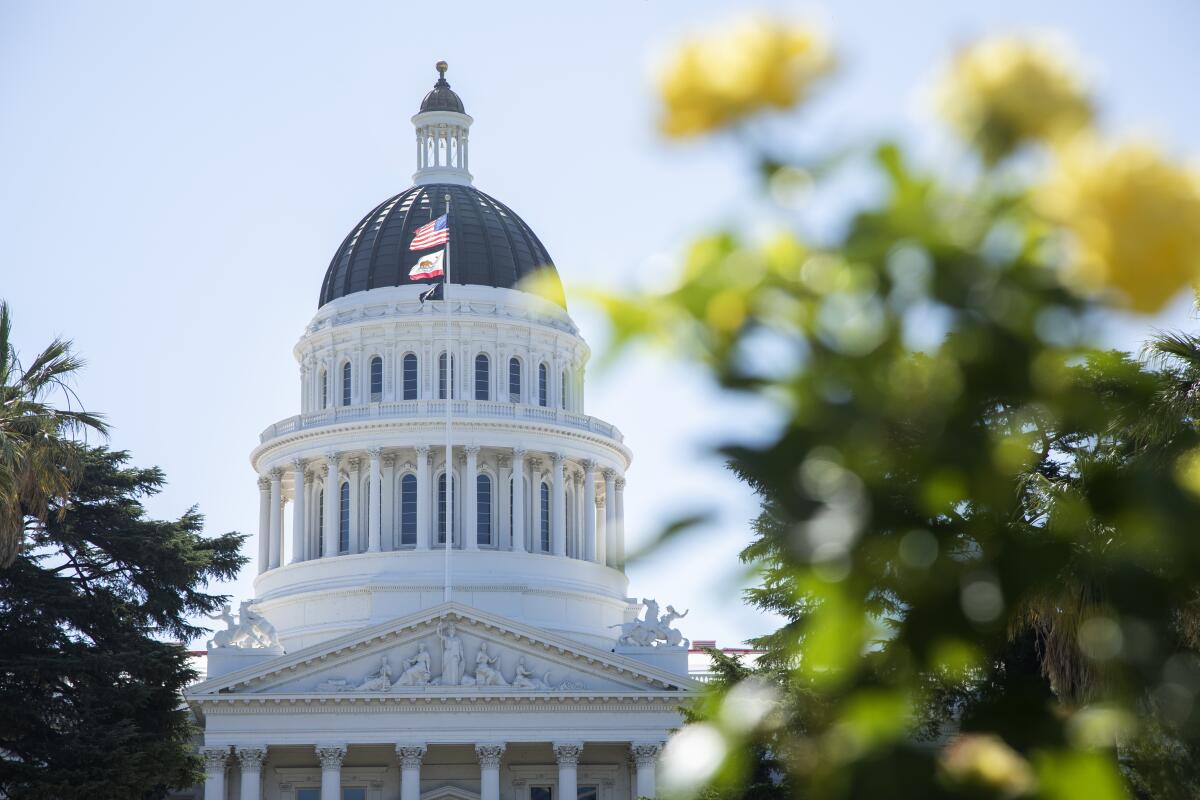
- Share via
This is the Nov. 17, 2022, edition of Boiling Point, a weekly newsletter about climate change and the environment in California and the American West. Sign up here to get it in your inbox.
With Democrats retaining control of the U.S. Senate and Republicans capturing a narrow majority in the House of Representatives, the odds of further climate action in Congress the next two years are low.
That makes state and local governments all the more important in confronting global warming — and across the American West last week, voters weighed in on candidates and ballot measures with huge climate implications.
Even where global warming wasn’t explicitly on the ballot, it was lurking just beneath the surface. Will cities and counties attempt to phase out gas stoves and heaters in new homes? Will state lawmakers require higher levels of renewable energy on the power grid? And even if Congress doesn’t pass any additional climate bills, what kinds of funding will senators and representatives work to bring home to their constituents?
Here are some election results from across the West that caught my attention:
California
U.S. Rep. Karen Bass defeated billionaire developer Rick Caruso in the race for Los Angeles mayor. Bass supports Mayor Eric Garcetti’s goal of 100% clean electricity by 2035, an ambitious target for the nation’s second-largest city. Caruso released a climate plan late in the campaign and didn’t make it a focus. In the governor’s race, meanwhile, Gavin Newsom cruised to reelection, defeating Republican challenger Brian Dahle, a state senator who would like to see California drill for more oil.
Voters soundly rejected Proposition 30, which would have increased tax rates for wealthy Californians and dedicated tens of billions of dollars to electric vehicle incentives and charging stations. How did nearly 60% of voters end up opposing such a popular-sounding proposal? Newsom’s opposition probably helps explain it, with one Newsom advisor telling my colleague Phil Willon that the governor’s credibility on environmental issues proved to be more valuable than the tens of millions of dollars ride-hailing company Lyft spent bankrolling the “Yes on 30” campaign.

Election results in the Imperial Valley could have big consequences for the Colorado River and the Golden State’s energy future. Nobody controls more Colorado River water than the Imperial Irrigation District, making its five elected board members some of the most powerful people in the West. Agricultural business owner Gina Dockstader appears headed to victory over former Brawley City Councilmember Don Campbell for an open seat on the board. And in an Imperial County supervisor’s race, incumbent Ray Castillo — a big supporter of solar development on agricultural land — looks likely to lose to farmer John Hawk, who has called for no more solar on farmland. I’ll have more on Imperial soon as part of my Repowering the West series.
Change could be coming to Westlands Water District, with a slate of reform candidates getting elected to lead the massive agricultural irrigation provider in the San Joaquin Valley. The four winning candidates campaigned on spending less time fighting with environmentalists and more time recharging groundwater aquifers and banking water in wet years, as Lois Henry wrote for SJV Water before the election. The new directors could soon oust Westlands’ longtime general manager.
Oil and gas companies spent millions backing moderate Democrats for state Legislature — with mixed results. Here’s a preelection primer from Aaron Cantú at Capital & Main. In two Sacramento-area races, oil-industry-backed state Senate hopeful Angelique Ashby and Assembly candidate Stephanie Nguyen held leads as ballot counting continued. Same with Esmeralda Soria, a Fresno-area Democrat running for Assembly. But in a San Fernando Valley state Senate race, Caroline Menjivar held a big lead over Daniel Hertzberg, who received support from a group funded in part by Chevron. And in a Senate district spanning parts of San Diego and Orange counties, Democrat Catherine Blakespear led her fossil-fuel-industry-backed GOP opponent.
In the Democrat-on-Democrat battle for a powerful seat on L.A. County’s Board of Supervisors, West Hollywood City Councilmember Lindsey Horvath has been widening her lead over state Sen. Bob Hertzberg. Many climate activists opposed Hertzberg, who several years ago helped block a bill that would have banned oil and gas drilling near homes and schools.
Sacramento County residents appear to have rejected Measure A, which would have increased sales taxes by a half-cent to fund transportation projects. The funds would have helped grow Sacramento’s light rail public transit. But they also would have been used to expand the region’s highway system, potentially fueling suburban sprawl and more driving, critics said.
Two Central Valley congressional races in which water and agriculture played a major role remained uncalled Wednesday. In the 22nd Congressional District — which my colleague Alejandra Reyes-Velarde profiled last week — incumbent Republican Rep. David Valadao leads Democrat Rudy Salas by several percentages points. The story is reversed in the 13th District, where Democrat Adam Gray is up by a few points over Republican farmer John Duarte.
Arizona
Groundwater pumping by big farms has gotten so bad in rural Arizona that residents of the extremely conservative county voted to regulate themselves — or at least some of them did. With household wells running dry in Cochise County, voters used the ballot to create a groundwater “active management area” to limit pumping for the first time, the Arizona Republic’s Jake Frederico writes. But a similar proposal to create a second management area in another part of the county failed. For background on the massive farms driving the groundwater overdraft, see this fascinating piece by Grist’s Jake Bittle.
Democrat Katie Hobbs, Arizona’s secretary of state, edged out her Republican opponent, Kari Lake, in the governor’s race. Hobbs campaigned on carbon-free electricity by 2050, whereas Lake, a former TV news anchor, hoped to block local governments from moving away from natural gas or promoting solar, as Jason Plautz reported for E&E News. In the state attorney general’s race, Democrat Kris Mayes — who made the environment a major campaign focus — was clinging to a small lead over Republican Abe Hamadeh, who said during one debate, “We don’t have time to tackle climate change.”
Kirsten Engel, a law professor who specializes in climate change and the environment, lost a close race for Congress. The Democrat was defeated by Republican Juan Ciscomani, who does not mention climate change on his campaign website.
Two new Republicans got elected to the Arizona Corporation Commission, creating a 4-1 GOP majority. That makes the agency even less likely to reinstitute a 100% clean energy requirement for utilities that was passed and then scrapped, the Arizona Republic’s Ryan Randazzo reports. Arizona residents also reelected State Treasurer Kimberly Yee, a Republican, who could follow a GOP movement of pulling state investment funds from companies working to phase out fossil fuels, Vox’s Rebecca Leber writes.
Significant turnover is coming to the Central Arizona Water Conservation District, which oversees the state’s Colorado River canal and is a key player in negotiating cutbacks as Lake Mead dwindles. More details here from Shaun McKinnon at the Arizona Republic, who writes that at least three newcomers will be joining the agency’s board.
Colorado

U.S. Rep. Lauren Boebert — the gun-toting, anti-vaccine conspiracy theorist whose husband consulted for a natural gas company, and who has spouted pro-fossil-fuel talking points — faced a surprisingly close reelection challenge. She held a razor-thin lead over Democratic opponent Adam Frisch as the remaining votes were counted. Fisch told Colorado Public Radio that water and renewable energy would be two of his top priorities if elected.
The Centennial State’s governor’s office, attorney general’s office and statehouse — plus a U.S. Senate seat — remained in Democratic hands, four years after the party took control of the Capitol. Based on those results, the League of Conservation Voters said it expects Colorado to “continue making major investments in clean air and clean energy.” HuffPost’s Chris D’Angelo notes that newly reelected Sen. Michael Bennet has consistently pushed to conserve public lands in the state.
Boulder and Denver residents voted to approve tax hikes to fund a range of climate projects, including solar installations, electric vehicle charging stations and fire-hardening of homes. Details here from CPR’s Miguel Otárola.
Nevada
Silver State residents reelected Sen. Catherine Cortez Masto, who supports renewable energy and wants to limit fossil fuel drilling on public lands. Her GOP opponent, Adam Laxalt, was backed by oil and gas industry funding and argued Democrats are depriving the nation of “energy independence” by pushing for climate action, per Delaney Dryfoos at Inside Climate News. On the flip side, Trump-backed Republican Joe Lambardo, the Clark County sheriff, defeated incumbent Democrat Steve Sisolak in the governor’s race. Sisolak has signed laws promoting clean energy, whereas Lombardo has no climate plan.
New Mexico
Land of Enchantment residents reelected Gov. Michelle Lujan Grisham, who signed the state’s 100% clean energy law but has also supported continued oil and gas drilling on public lands. New Mexico voters also rejected the reelection bid of U.S. Rep. Yvette Herrell, who has denied the scientifically proven link between fossil fuel companies and climate change. They instead sent Democrat Gabe Vasquez to Congress, to represent a district that includes New Mexico’s portion of the Permian Basin oil and gas field. Vasquez made climate action and clean energy pillars of his campaign.
Democratic incumbent Stephanie Garcia Richard will get another term as New Mexico’s public lands commissioner. She campaigned on diversifying the state’s heavily oil- and gas-dependent economy, in contrast to her GOP opponent.
Montana
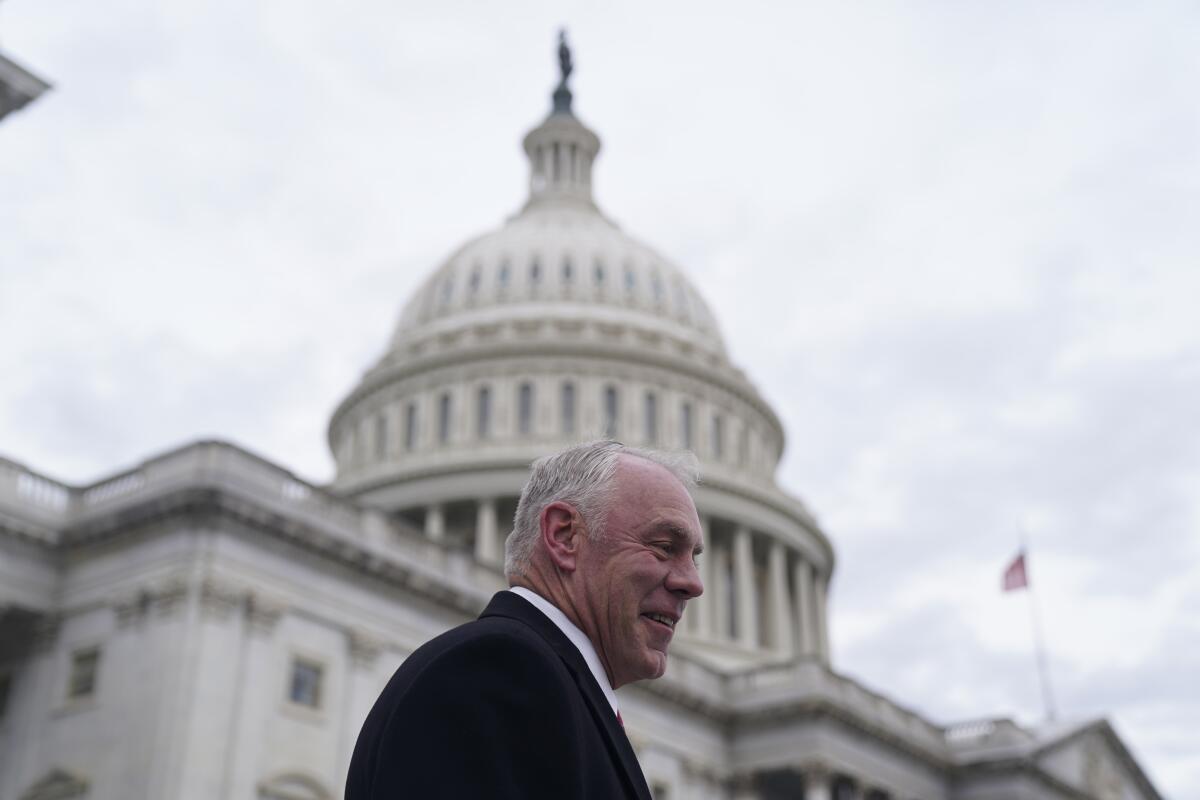
Former Interior Secretary Ryan Zinke, who left the Trump administration under a cloud of ethical scandal, will return to Congress. Zinke was elected to the House, defeating Democratic candidate Monica Tranel by a few thousand votes. As HuffPost’s Chris D’Angelo writes, “He has all but promised to be an unwavering advocate of the fossil fuel industry that he helped prop up as a member of the Trump administration and subsequently made hundreds of thousands of dollars consulting for.”
Montana Republicans won their first legislative supermajority in the history of the state’s modern Constitution. Details here from Arren Kimbel-Sannit at Montana Free Press. This means lawmakers could conceivably vote to eliminate a constitutional right to environmental protection, as Vox’s Rebecca Leber notes. Voters also elected Ann Bukacek — a climate-denying anti-vaxxer — as the newest member of Montana’s Public Service Commission, which regulates the energy industry.
Oregon
With a third candidate shaking up the governor’s race, the state nearly elected a Republican who led a walkout in the Legislature to block climate action and who vowed to “tear up” a key emissions policy on Day One. But Democrat Tina Kotek came out on top, meaning the Beaver State will probably continue its climate leadership. Before the election, Emma Rickets wrote for Inside Climate News about why this race matters.
In a closely watched congressional race, Republican Lori Chavez-DeRemer — who responded to questions about climate by stating that “the climate has been changing for thousands and thousands of years” — eked out a win, flipping a blue seat. She defeated Democrat Jamie McLeod-Skinner, who listed climate as one of her top priorities. In two other close congressional races, Oregonians elected Democrats Andrea Salinas and Val Hoyle, both of whom campaigned on robust climate platforms.
Portland voters ousted City Commissioner Jo Ann Hardesty, who helped create the city’s Clean Energy Fund. The innovative climate justice program doles out grants to help local residents afford clean energy technologies, and to combat social inequities. Hardesty lost to Rene Gonzalez, a more conservative businessperson who promised to crack down on homelessness and crime.
Washington
In what the Seattle Times described as “the upset of the year,” voters sent auto shop owner Marie Gluesenkamp Perez to Congress, handing her a narrow victory over a Trump-backed Republican. Gluesenkamp Perez was endorsed by the advocacy group Climate Hawks Vote, which lauded her support for green jobs and her pledge not to take fossil fuel campaign money.
With Republicans taking control of the House, Washington Rep. Cathy McMorris Rodgers is in line to chair the Energy and Commerce Committee. In an interview with the Washington Post’s Maxine Joselow, she said she would investigate climate investments from the Inflation Reduction Act. “It’s critical that we are not wasting hundreds of billions of dollars on a political agenda that is forcing a green energy transition that jeopardizes our reliability and increases costs,” she said.
Wyoming
Harriet Hageman easily won election to the Cowboy State’s lone House seat, after previously defeating Rep. Liz Cheney in the GOP primary. Hageman is a natural resources attorney who wants to see federal lands turned over to state control, and her election “could have huge implications for public lands in Wyoming and across the country,” HuffPost’s Chris D’Angelo writes.
**
All right, enough election stuff. Here’s what else is happening around the West:
TOP STORIES
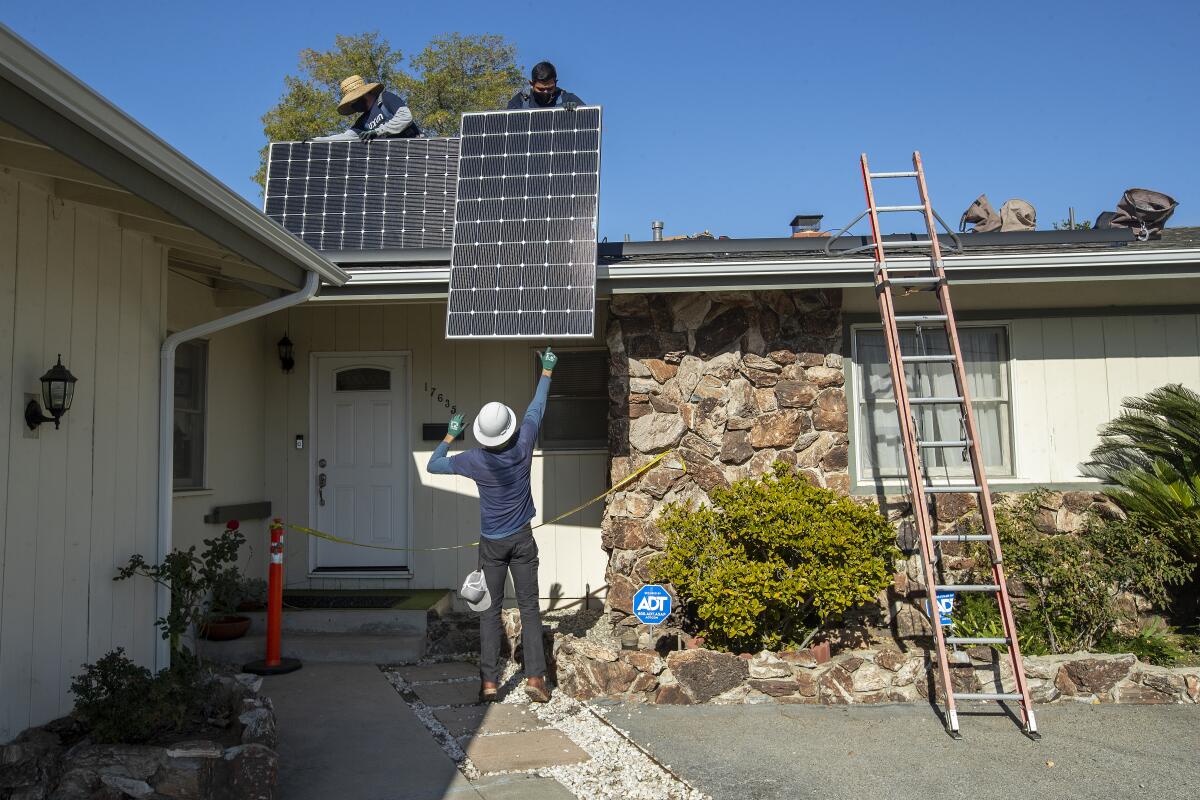
California officials have once again proposed slashing incentives for rooftop solar panels. Their latest plan wouldn’t reduce payments to solar-powered homes and businesses as much an earlier proposal, but it would still result in fewer households installing rooftop systems, solar companies and climate activists told me. Monopoly utility companies including Southern California Edison are also crying foul, saying the proposed revisions to the state’s “net metering” incentive program don’t go far enough to reduce an unfair subsidy that benefits wealthier families at the expense of their lower-income neighbors.
As Elon Musk fires Twitter employees who criticize him and generally creates chaos on the social media platform, observers who have followed his work at Tesla may not be especially surprised. The Times’ Russ Mitchell has been reporting on Musk’s leadership of the electric car company for years, and he’s got a roundup of past accusations from the billionaire’s employees. Those accusations include Musk seeking retribution, covering up injuries and cracking down on union activity.
California has finalized its latest long-term plan for combating the climate crisis. The state will need 30 times as many electric and zero-emission vehicles — and four times as much solar and wind power — by 2045, according to the latest “scoping plan” from the California Air Resources Board, my colleague Tony Briscoe reports. We’ll need to start driving less, too.
As global warming drives hotter heat waves, it will be increasingly important for government to help people keep their water and power on, even if they fall behind on their bills. So it’s a big deal that Los Angeles officials voted this week to stop shutting off utilities to low-income customers and senior citizens who can’t pay their bills, as Hayley Smith reports. If you live in L.A. (or elsewhere in California) and are having trouble paying your utility bills, Dorany Pineda wrote about how you can get help.
WATER IN THE WEST
Four years ago, California mandated that 40% of the natural flow of the Tuolumne, Merced and Stanislaus rivers remain in the waterways during peak times. But after pushback from cities and farmers who draw water from those rivers, state officials have struck a deal with the San Francisco Public Utilities Commission and two Central Valley irrigation districts to ease those rules. Environmental activists say the new agreements could result in immense harm to struggling fish species.
California’s Coachella Valley, which uses enormous amounts of water in the desert, will cut back on its Colorado River water consumption — not by asking farmers to use less, but by putting less into groundwater aquifers that serve urban residents. Those aquifers were over-pumped for decades, and replenishment with Colorado River water has been a key strategy for getting them back into balance. But Coachella Valley Water District staff told the Desert Sun’s Erin Rode that cutting back on aquifer replenishment gives them more control over conservation than asking farmers to use less.
Ever gone bungee-jumping off the Bridge to Nowhere, deep within Angeles National Forest? Well, this might be your last chance: A volunteer group is suing Los Angeles County to get the venture shut down, alleging it’s operating an unpermitted helipad — and a chemical toilet that could pollute the San Gabriel River. Details here from The Times’ Louis Sahagún.
POLITICAL CLIMATE
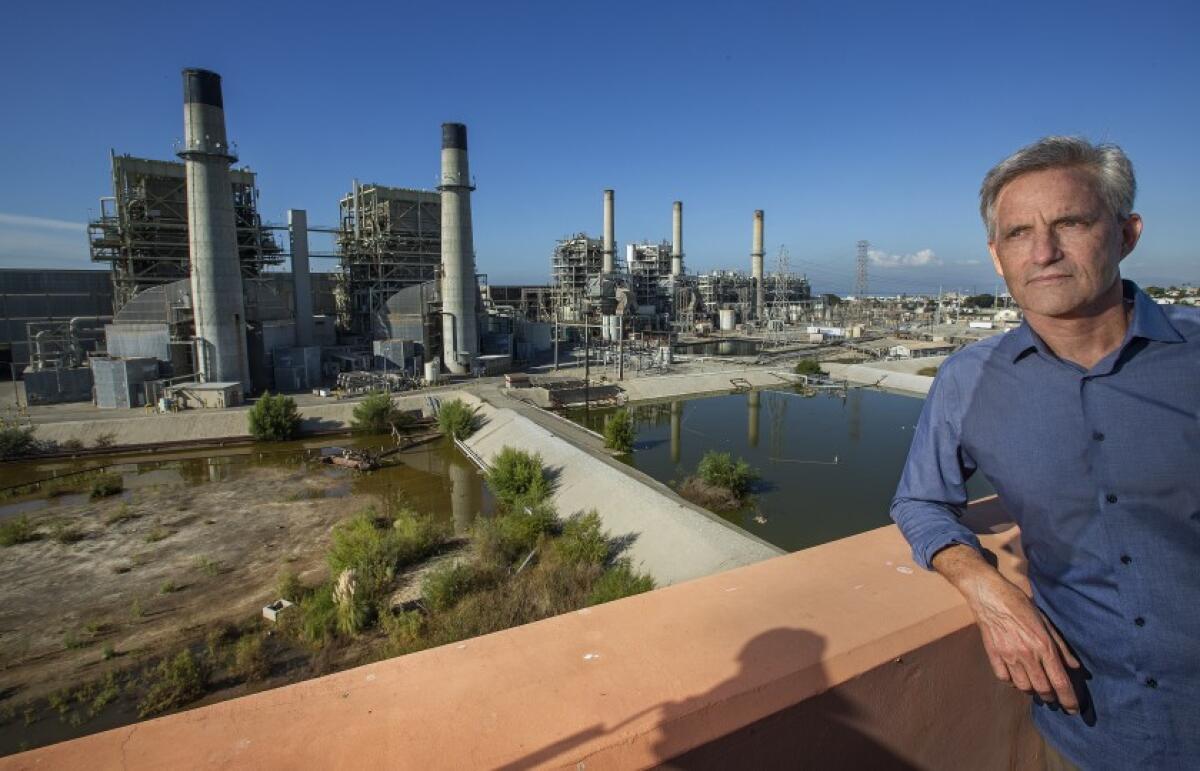
There’s a new twist in the fight over an aging gas-fired power plant on the Southern California waterfront. My colleague Liam Dillon reports that Redondo Beach Mayor Bill Brand — who has led the campaign to shut down the gas plant and replace it with a public park — sent crude, nasty emails about his political opponents while working to block new residential and commercial developments at the gas plant site. In one email, Brand wrote that the “increasingly latino laden Coastal Commission” would dislike a project because it was too luxurious and exclusive. For background on the gas plant, see my previous coverage.
Former NAACP President Ben Jealous will be the Sierra Club’s next executive director. Here’s the story from Josh Kurtz at Maryland Matters. Jealous will replace Michael Brune, who resigned last year amid an internal reckoning over the legacy of the environmental group’s iconic founder John Muir and the racist statements Muir made about Black and Indigenous people.
California is the latest state to sue manufacturers of cancer-causing “forever chemicals.” Officials are seeking damages and financial penalties from 20 chemical manufacturers, including 3M and DuPont de Nemours Inc., The Times’ Susanne Rust reports. “We won’t let them off the hook for the pernicious damage done to our state,” said Rob Bonta, the state’s attorney general.
THE ENERGY TRANSITION
The Biden administration is once again tightening regulation of methane, a planet-warming gas more potent than carbon dioxide. Under a rule proposed by the Environmental Protection Agency, operators of small oil and gas wells will be required to find and plug leaks, and fossil fuel companies will have to respond to third-party reports of large leaks, per Matthew Daly and Seth Borenstein at the Associated Press. But in an eye-opening reality check, the AP’s Cathy Bussewitz reports that equipment designed to stop methane leaks frequently breaks down or isn’t maintained by oil and gas companies, leading to loads of emissions.
A recent study promoting green hydrogen as a climate solution was secretly funded and reviewed by natural gas companies. Here’s the scoop from the Boston Globe’s Sabrina Shankman, who writes that a gas-industry-linked lobbyist helped draft the study’s recommendations to policymakers too. Meanwhile, another new study concludes that research from fossil-fuel-industry-funded energy policy centers at Columbia, MIT and Stanford are more favorable to natural gas than similar research from other universities, Gizmodo’s Molly Taft writes. This is all relevant in Los Angeles, where Southern California Gas Co. is pushing hydrogen as a climate solution, and city officials are considering a plan to switch from gas to hydrogen at several power plants.
West Virginia Sen. Joe Manchin III is blocking President Biden’s nomination of Richard Glick to continue leading the Federal Energy Regulatory Commission, which could create obstacles to the clean energy transition. Here’s the story from Miranda Willson and Nico Portuondo, who note that the commission would have a 2-2 Democrat-Republican split without Glick.
ONE MORE THING
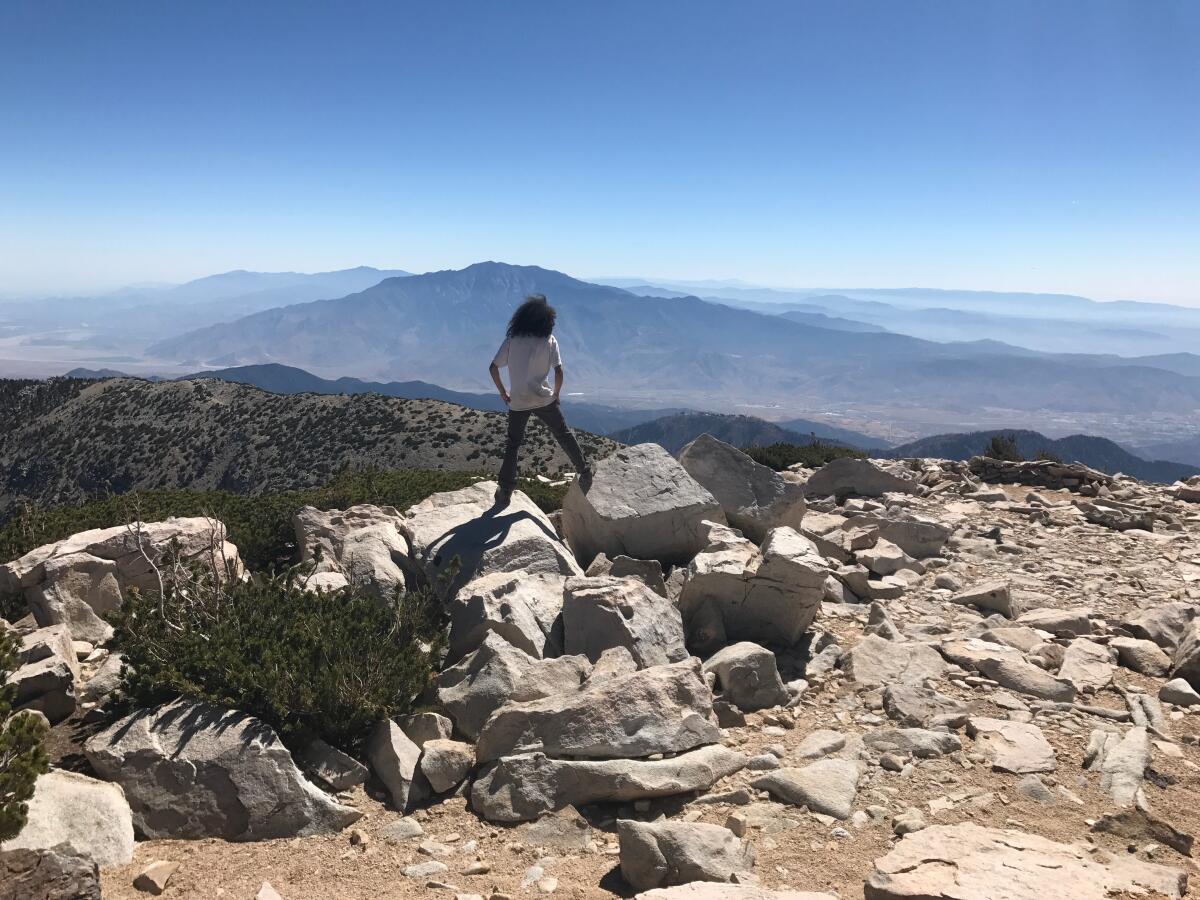
The Supreme Court’s 1972 ruling in Sierra Club vs. Morton — commonly known as the Mineral King case — played a key role in shaping the modern environmental movement, helping establish the principle that activist groups such as the Sierra Club can bring lawsuits against potentially destructive projects. The case involved Walt Disney Co.’s efforts to build an enormous ski resort in the southern Sierra Nevada, on land surrounded on three sides at the time by Sequoia National Park.
What I didn’t know until this month is that Disney originally considered building his ski resort on Mount San Gorgonio, Southern California’s highest peak and one of my favorite hiking spots. That’s me in the photo above, standing at Gorgonio’s 11,500-foot peak and admiring the view of nearby Mt. San Jacinto. It’s hard to imagine the mountain getting overtaken by a ski resort.
Shout-out to urban planner Sam Gennawey for including that fascinating historical tidbit in his book “Walt and the Promise of Progress City.” It’s a great read for Disney fans, and also for people interested in public transit and sustainable cities.
We’ll be back in your inbox next week. If you enjoyed this newsletter, or previous ones, please consider forwarding it to your friends and colleagues. For more climate and environment news, follow me on Twitter @Sammy_Roth.
Toward a more sustainable California
Get Boiling Point, our newsletter exploring climate change, energy and the environment, and become part of the conversation — and the solution.
You may occasionally receive promotional content from the Los Angeles Times.






